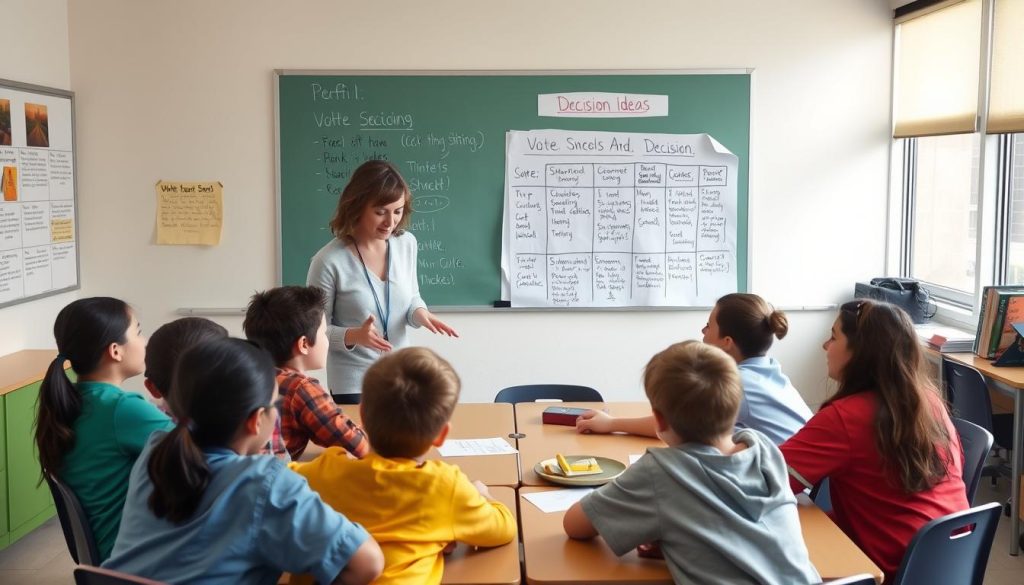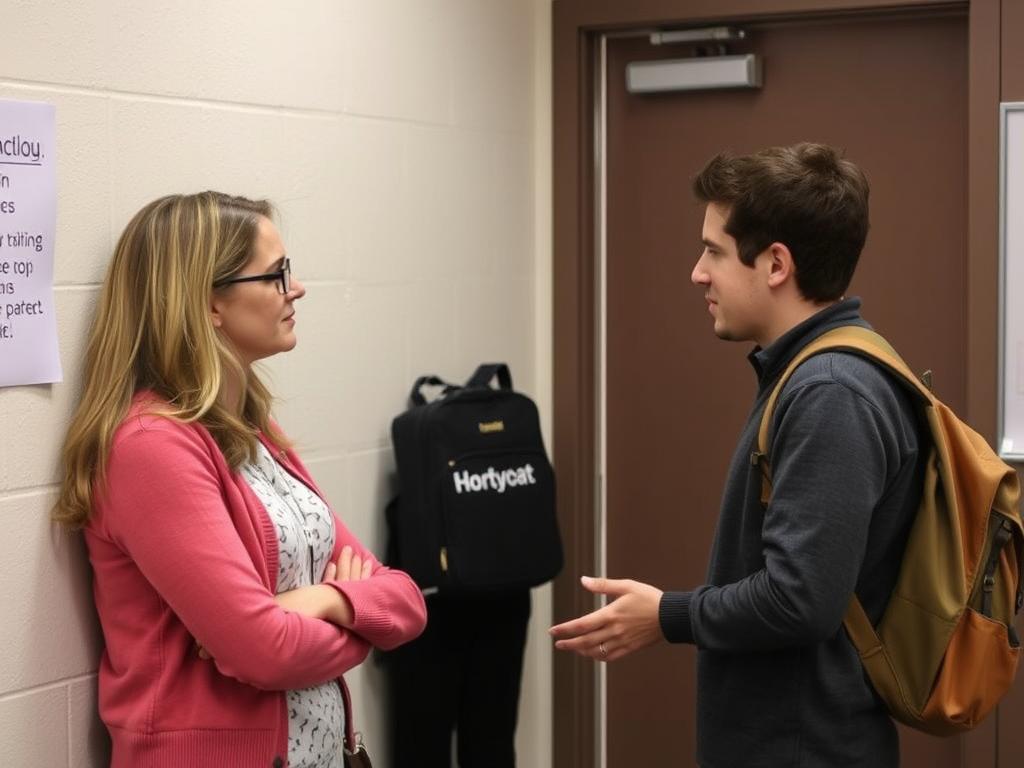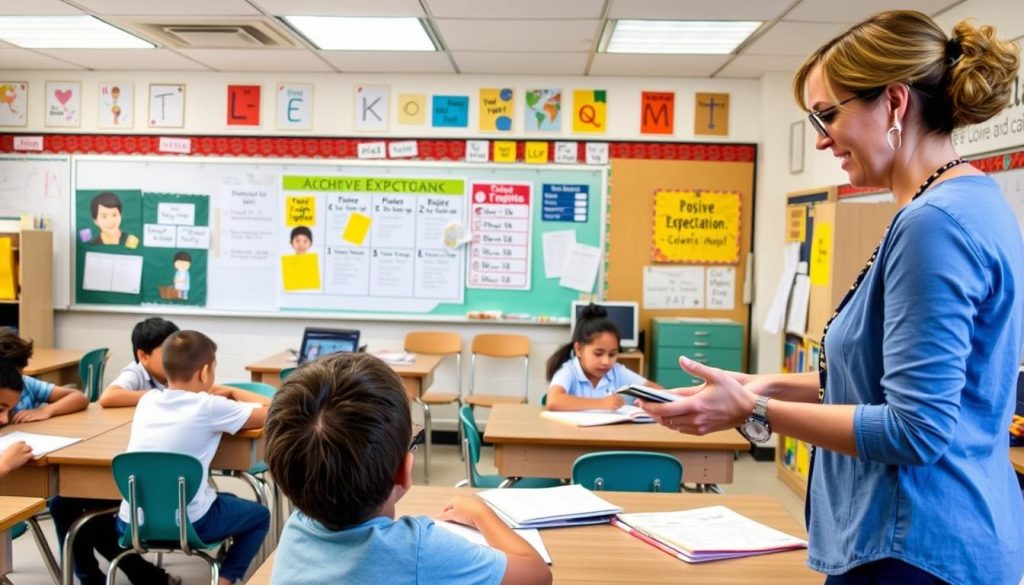Classroom Management Skills #1: Building Authentic Relationships
The foundation of effective classroom management skills begins with genuine connections. Love and Logic emphasizes that when students feel valued and understood, behavioral issues naturally decrease. This isn’t about being their friend—it’s about creating a classroom culture where students know you care about them as individuals.
Start each day by greeting students at the door by name. This simple teacher skill sets a positive tone and allows you to gauge each student’s emotional state before class begins. Research from the Journal of Positive Behavior Interventions shows that this practice alone can reduce disruptive behavior by up to 27%.
Try these relationship-building strategies:
- Learn personal details about each student’s interests and reference them in conversations
- Share appropriate stories from your own life to model vulnerability
- Use “connection before correction” when addressing behavior issues
- Implement regular class meetings to discuss concerns and celebrate successes
Remember that relationship-building isn’t a one-time event but an ongoing process that requires consistent effort and genuine interest in your students’ lives.
Classroom Management Skills #2: Setting Clear Expectations
Confusion breeds chaos. One of the most critical teacher skills is establishing crystal-clear expectations from day one. Love and Logic classroom management emphasizes that students thrive when they understand exactly what’s expected of them.
Unlike traditional approaches that impose rules from above, Love and Logic encourages involving students in creating classroom guidelines. This collaborative approach increases buy-in and helps students develop ownership of their learning environment.
“Students will rise or fall to the level of our expectations. When we clearly communicate what we expect, we give them a target to aim for.”
Effective expectation-setting includes:
- Keeping rules simple, positive, and limited to 3-5 key expectations
- Discussing the “why” behind each expectation
- Practicing procedures until they become routine
- Revisiting expectations regularly, especially after breaks
These classroom management skills create a predictable environment where students feel secure and understand boundaries. When expectations are clear, you’ll spend less time managing behavior and more time teaching.
Ready to Transform Your Classroom?
Discover how the Love and Logic approach can revolutionize your classroom management skills with our comprehensive online course.
Classroom Management Skills #3: Offering Controlled Choices
Power struggles are the nemesis of effective classroom management. Love and Logic offers a brilliant solution: controlled choices. This teacher skill transforms potential conflicts into opportunities for student decision-making while maintaining your authority.
The key is offering only choices you’re comfortable with. Instead of asking, “Will you please sit down?” (which invites a yes/no response), try “Would you like to sit at your desk or at the reading table to complete this assignment?” This approach gives students a sense of control while ensuring they meet your expectations.
Effective controlled choices should be:
- Age-appropriate and meaningful to students
- Limited to 2-3 options to prevent overwhelm
- Delivered in a calm, matter-of-fact tone
- Framed positively rather than as threats
This classroom management strategy works because it respects students’ need for autonomy while maintaining necessary boundaries. As one teacher who implemented Love and Logic principles noted, “My power struggles decreased by 80% when I started offering more choices throughout the day.”
Classroom Management Skills #4: Implementing Natural Consequences

Traditional discipline often relies on punishment, which can damage teacher-student relationships. Love and Logic classroom management takes a different approach by emphasizing natural and logical consequences. This teacher skill helps students connect their choices with real-world outcomes.
Natural consequences occur without teacher intervention—if a student doesn’t bring a pencil, they can’t complete their work. Logical consequences are teacher-created but directly related to the behavior—if a student misuses materials, they lose access to those materials temporarily.
The effectiveness of this approach lies in its authenticity. Students learn from experience rather than from lectures or arbitrary punishments. This develops internal motivation and responsibility—essential life skills that extend far beyond your classroom.
When implementing consequences:
- Deliver them with empathy, not anger
- Keep them reasonable and related to the behavior
- Allow students to experience the discomfort of poor choices
- Avoid rescuing students from the consequences of their actions
This classroom management approach requires patience and consistency, but the long-term benefits for student development are substantial. By allowing students to experience the natural outcomes of their choices, you’re preparing them for success in the real world.
Using Empathy Before Delivering Consequences
Perhaps the most distinctive aspect of Love and Logic classroom management is the emphasis on empathy before consequences. This powerful teacher skill transforms how students receive feedback and discipline.
When a student misbehaves, your first response should be genuine empathy—”How sad” or “I can see this is difficult”—before applying any consequence. This approach defuses defensiveness and opens students to learning from their mistakes.
“Empathy opens the heart and mind to learning. Anger and frustration close them.”
The empathy-first approach works because:
- It maintains the student’s dignity
- It models emotional intelligence
- It prevents power struggles
- It strengthens your relationship even during disciplinary moments
This classroom management skill requires practice, especially when you’re frustrated. However, teachers who master this approach report significant improvements in classroom climate and student responsiveness to redirection.
Remember that empathy doesn’t mean you don’t hold students accountable—it simply changes how you deliver consequences in a way that preserves the relationship and maximizes learning.
Enhance Your Teacher Skills
Discover professional development opportunities that can transform your classroom management approach and qualify for continuing education credits.
Classroom Management Skills #6: Using Enforceable Statements
Traditional classroom management often relies on commands that are difficult to enforce: “Stop talking,” “Pay attention,” or “Be respectful.” Love and Logic introduces a more effective teacher skill: enforceable statements that focus on what you will do rather than what you want students to do.
Enforceable statements put you in control by focusing only on your own actions. For example, instead of “Turn in your homework,” try “I collect homework at the beginning of class.” Instead of “Be quiet,” say “I teach when there are no interruptions.”
This subtle shift in language is powerful because:
- It eliminates power struggles by focusing on your actions, not theirs
- It places responsibility for choices and consequences on students
- It preserves student dignity while maintaining boundaries
- It models assertive rather than aggressive communication
Effective enforceable statements should be:
- Stated calmly and matter-of-factly
- Focused on what you will provide, allow, or do
- Free of threats or emotional manipulation
- Followed through consistently
This classroom management approach shifts the dynamic from coercion to choice, helping students develop internal motivation rather than compliance based on fear or people-pleasing.
Classroom Management Skills #7: Developing Shared Control

Effective classroom management isn’t about controlling students—it’s about creating an environment where students learn to control themselves. The Love and Logic approach emphasizes shared control as a critical teacher skill that balances authority with student autonomy.
Research consistently shows that students who feel some sense of control over their learning environment are more engaged and exhibit fewer behavior problems. The key is finding appropriate areas where students can exercise choice and voice.
Opportunities for shared control include:
- Classroom jobs and responsibilities
- Input on classroom procedures and rules
- Options for demonstrating learning (projects, presentations, written work)
- Class meetings to solve community problems
This classroom management approach requires thoughtful planning to determine which decisions are appropriate for student input and which must remain with the teacher. The goal is to gradually increase student responsibility as they demonstrate readiness.
One middle school teacher who implemented this approach noted, “When I started giving my students more voice in classroom decisions, their investment in our community skyrocketed. Behavior issues decreased because they felt ownership of our space and routines.”
Classroom Management Skills #8: Delaying Consequences When Necessary

In the heat of a classroom disruption, immediate consequences often escalate rather than resolve the situation. Love and Logic introduces a powerful teacher skill: delaying consequences until emotions have cooled. This approach allows for more thoughtful, effective responses to misbehavior.
When a student misbehaves, instead of immediate punishment, try saying, “I’m going to have to do something about this, but not right now. We’ll talk later.” This simple phrase buys you time to consider an appropriate response while avoiding disruption to your lesson.
The benefits of delayed consequences include:
- Preventing emotional reactions that can damage relationships
- Giving you time to design consequences that fit the situation
- Creating anticipation that often leads to self-reflection
- Maintaining classroom flow without extended disruptions
This classroom management approach is particularly effective with challenging behaviors that might otherwise trigger an emotional response from you. By delaying your reaction, you model emotional regulation and thoughtful problem-solving.
Remember that delay doesn’t mean forgetting—follow-up is essential. Schedule a brief, private conversation with the student to discuss the behavior and its consequences.
Master Love and Logic Techniques
Transform your classroom with comprehensive training in Love and Logic principles and earn professional development credits.
Classroom Management Skills #9: Modeling Self-Care and Emotional Regulation
The final and perhaps most overlooked classroom management skill in the Love and Logic approach is teacher self-care and emotional regulation. Your ability to manage your own emotions directly impacts your effectiveness in managing student behavior.
Students are constantly watching how you handle stress, frustration, and challenges. When you model healthy emotional regulation, you teach this essential life skill more effectively than any formal lesson could.
Practical self-care strategies for teachers include:
- Developing personal calming techniques to use during challenging moments
- Creating boundaries between work and personal life
- Building a support network of colleagues who understand your challenges
- Practicing positive self-talk and reframing difficult situations
This teacher skill is particularly important when implementing Love and Logic principles, which require emotional steadiness and consistency. By prioritizing your own well-being, you create the capacity to respond rather than react to classroom challenges.
As one elementary teacher noted, “My classroom management improved dramatically when I started taking better care of myself. I had more patience, more creativity in problem-solving, and more genuine empathy for my students’ struggles.”
Implementing Love and Logic Classroom Management Skills

Transforming your classroom management approach doesn’t happen overnight. Implementing Love and Logic principles requires patience, practice, and persistence. Here are practical tips for integrating these teacher skills into your daily practice:
Start Small
Choose one Love and Logic technique to implement first, rather than overhauling your entire approach at once. Many teachers find that starting with enforceable statements or controlled choices provides quick wins that build confidence.
Be Consistent
Consistency is crucial for effective classroom management. Students need to know that your responses will be predictable, even when their behavior isn’t. This creates a sense of safety that supports learning.
Seek Support
Connect with colleagues who are also implementing Love and Logic principles. Sharing successes, challenges, and strategies can accelerate your growth and provide emotional support during the transition.
Reflect Regularly
Set aside time each week to reflect on what’s working and what needs adjustment. This reflective practice is a hallmark of effective teacher skills development.
Remember that implementing new classroom management skills often involves temporary discomfort as both you and your students adjust to new expectations and interactions. Trust the process—the long-term benefits for your classroom climate and student development are worth the investment.
Transform Your Classroom with Love and Logic Skills
Effective classroom management skills are the foundation of successful teaching. The nine Love and Logic principles we’ve explored offer a comprehensive approach that balances empathy with accountability, creating a learning environment where students can thrive academically, socially, and emotionally.
By implementing these teacher skills—building relationships, setting clear expectations, offering controlled choices, using natural consequences, leading with empathy, making enforceable statements, sharing control, delaying consequences when appropriate, and modeling self-care—you create a classroom where discipline problems decrease and learning opportunities increase.
The journey to masterful classroom management is ongoing, but each step you take improves your teaching experience and your students’ learning outcomes. As you incorporate these principles, you’ll discover your own unique style that honors both your teaching philosophy and the proven effectiveness of Love and Logic approaches.
Ready to Transform Your Teaching?
Take the next step in your professional development journey with comprehensive Love and Logic training that counts toward your continuing education requirements.
Frequently Asked Questions About Love and Logic Classroom Management
How long does it take to see results with Love and Logic classroom management skills?
Many teachers report seeing initial improvements within 2-3 weeks of consistent implementation. However, complete classroom culture transformation typically takes 2-3 months as students adjust to the new approach. The key is consistency and patience during the transition period.
Can Love and Logic principles work with students who have special needs?
Yes, Love and Logic principles can be effective with diverse learners, including those with special needs. The emphasis on clear expectations, natural consequences, and empathy creates a supportive environment for all students. However, you may need to adapt specific techniques based on individual student needs and abilities.
How do I balance Love and Logic approaches with school-wide discipline policies?
This is a common challenge. Start by identifying areas of overlap between Love and Logic principles and your school’s policies. Many schools find that Love and Logic complements their existing PBIS or restorative practices. For required procedures that seem to conflict with Love and Logic, focus on implementing them with empathy and respect for student dignity.
What if parents don’t support these classroom management approaches?
Communication is key. Share the principles and benefits of your classroom management approach with parents at the beginning of the year. Emphasize how these teacher skills help prepare students for real-world success by developing responsibility and problem-solving abilities. Many parents become supporters once they understand the long-term benefits of this approach.




